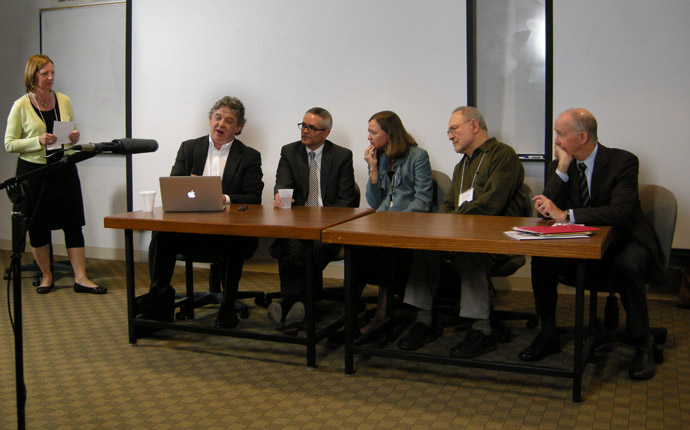
The Oct. 21-22 conference brought together research mathematicians, mathematics teacher educators, researchers, classroom teachers and school administrators to discuss a nationwide problem in mathematics education: how to implement the Standards for Mathematical Practice found in Common Core State Standards for K-12 math classrooms in meaningful, high quality ways. The message of the plenary speakers is that this will be an incredibly difficult task, but well worth the effort.
The success of the Common Core State Standards (CCSS) for Mathematics likely hinges on the degree to which the Standards for Mathematical Practices are implemented by teachers PreK-20. Such implementation will require a great deal of support, and require the development of a new professional culture of educators, in which teaching knowledge is publicly shared and highly valued. Teachers need to develop strong professional communities in which they work together to share well-designed tasks. Enacting Mathematical Practice Standards is not just important for "average" and "gifted" students, but is especially crucial for English Learners and struggling students.
While Nebraska has not yet adopted the Common Core State Standards, it may be wise for Nebraska teachers to think hard about how to integrate the Standards for Mathematical Practice into their teaching now and for the State to concider adopting the CCSS in the very near future. Otherwise we are at risk of finding our students lagging behind the nation in mathematics achievement and in receiving federal support linked to mathematics education. The Common Core State Standards for Mathematics are viewed by many as being more rigorous than the Nebraska Standards for Mathematics, especially with regard to the Standards for Mathematical Practices, and with the most of the nation’s states adopting them, much of the upcoming activity and research in mathematics education will be linked to the CCSS in some way.
During the morning breakout sessions, a number of presenters shared what various Math Science Partnership projects are doing related to enacting the Standards for Mathematical Practices with teachers.
During the afternoon breakout sessions, a number of Nebraska teachers shared the things they do to enact the Standards for Mathematical Practices: having students work on non-routine problems and communicate their reasoning to peers; working as mathematical coaches to help teachers learn how to better integrate problem solving in their daily lessons; and generally focusing on helping students learn the habits of mind of mathematical thinkers.
Slides and handouts from these presentations can be found on our website. Additionally, videos of most of the plenary sessions will be posted on our website in the near future. We will publish conference proceedings in the coming months that include articles written by each of the plenary speakers.
For many who attended the conference, the highlight was a banquet honoring UNL's Jim Lewis, who has dedicated much of his 40-year career to improving math education, from kindergarten through college, for women and minorities, in rural and urban schools.
UNL Mathematics Department Chair John Meakin was master of ceremonies for a banquet program featuring testimonials about the impact of Lewis's work on the lives of many people and on the profession. Several of Lewis's colleagues spoke of the tremendous influence he has had on their careers, including Judy Walker, UNL mathematics professor and incoming department chair; David Manderscheid, dean of the College of Arts and Sciences; Ruth Heaton, professor of Teaching, Learning and Teacher Education; Matt Larson, K-12 mathematics curriculum specialist for the Lincoln Public Schools; Paula Millerd, Omaha Public Schools teacher; and Christina Eubanks-Turner, mathematics professor at the University of Louisiana-Lafayette. Ron Rosier, executive director of the Conference Board of the Mathematical Sciences, spoke about Lewis's impressive national impact on mathematics education.
"Jim's work has had an extraordinary impact on the lives of a very large number of students, teachers, professional mathematicians, mathematics teacher educators and many of the leaders in the profession at the national level," Meakin said. "His work matters and he has had, and continues to have, a profound impact on mathematics education at all levels at UNL and on the national stage."
Lewis is the Aaron Douglas Professor of Mathematics and director of UNL's Center for Science, Mathematics and Computer Education. He is an award-winning teacher and member of UNL's Academy of Distinguished Teachers and was named Nebraska Professor of the Year for 2010 by the Carnegie Foundation for the Advancement of Teaching. Under his leadership as chair, the mathematics department won a 1998 Presidential Award for Excellence in Science, Mathematics and Engineering Mentoring. Lewis is a recipient of the university's Louise Pound-George Howard Distinguished Career Award and also has received awards from the UNL Chancellor’s Commission on the Status of Women and the Lincoln-Lancaster County Women's Commission for his support of opportunities for women in the mathematical sciences.
Lewis has been the principal investigator for the prestigious National Science Foundation-funded Math Matters, the Math and Science Partnership programs Math in the Middle and NebraskaMATH, and for NebraskaNOYCE: NSF Teaching and Master Teaching Fellows Program. He has served on many important national committees, including the National Research Council's Mathematical Sciences Education Board; as chair of the Mathematical Association of America's Coordinating Council on Education and of the American Mathematical Society Committee on Science Policy; as co-chair of the NRC committee that produced "Educating Teachers of Science, Mathematics, and Technology: New Practices for the New Millennium"; as a lead author for the Mathematics Department Chair ‘Bible’, “Towards Excellence: Leading a Doctoral Mathematics Department in the 21st Century”; and as the chair of the writing committees for the College Board of Mathematical Sciences original and revised editions of “The Mathematical Education of Teachers.” Lewis received his doctorate in mathematics from Louisiana State University.
More details at: http://go.unl.edu/dsg